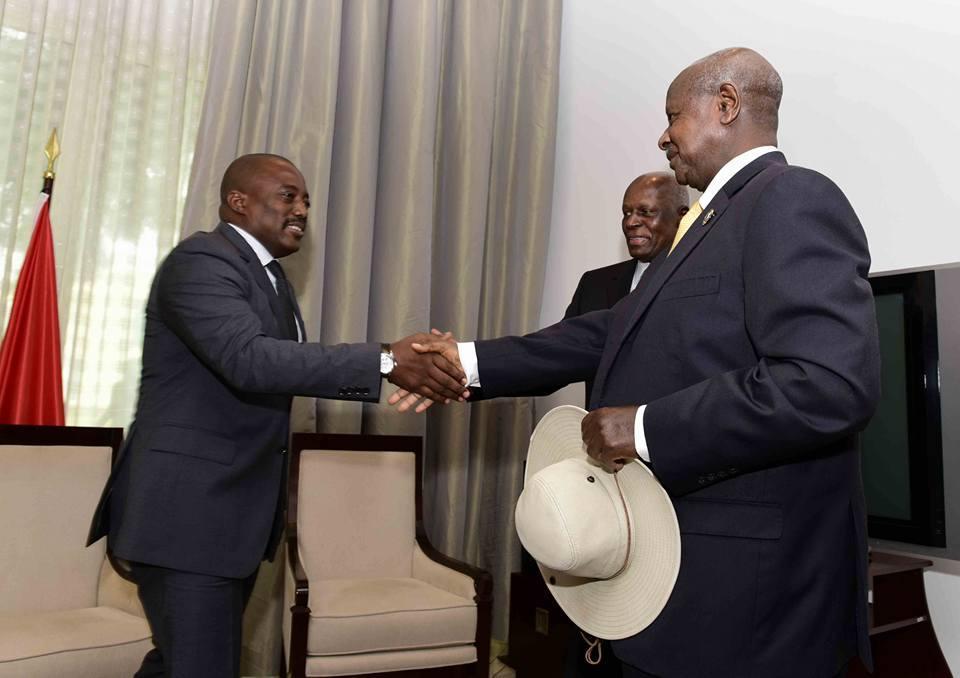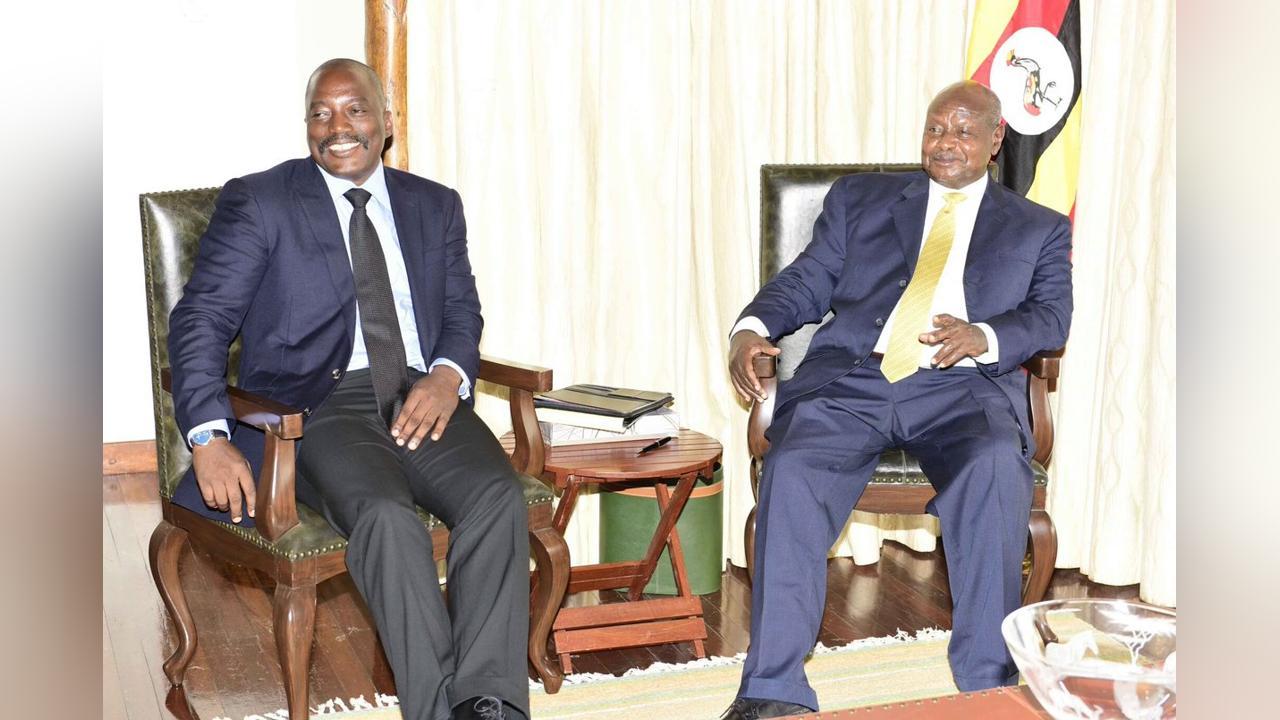By Faridah N Kulumba
Africa-Press – Uganda. Recently Uganda’s President Yoweri Kaguta Museveni blocked former Congolese President Joseph Kabila from crossing into the eastern Democratic Republic of Congo (DRC) through Uganda to access the rebel-held city of Goma. According to high-level regional sources, Kabila had planned to transit through southwestern Uganda to reach Goma — currently under the control of M23/AFC rebels with whom he is alleged to have close ties.
Diplomatic concerns
President Museveni made that decision citing serious diplomatic and security concerns. After Museveni learned about Lbila’s plan of crossing to Goma, he declined to authorize the crossing, arguing that it would jeopardize Uganda’s increasingly close cooperation with the DR Congo’s government of President Félix Tshisekedi. According to Ugandan officials, Museveni feared the move would antagonize Kinshasa, which has worked alongside Uganda in joint operations against the Allied Democratic Forces (ADF) — a terrorist group with historical roots in western Uganda but long based in eastern DRC.
In November 2021, Uganda and DR Congo launched a joint operation dubbed “Operation Shujaa” against the ADF, an armed group allied with Islamic State. The ADF has been based in the jungles of eastern Congo for more than two decades from where they launch attacks both within DR Congo and sometimes across the border in Uganda. The collaboration has also fuelled growing trade between Uganda and eastern Congolese provinces, now viewed as a vital economic frontier. In February President Museveni refuted the claim of international media reports that Uganda’s military presence in the eastern DR Congo was aimed at fighting the M23 rebels. This followed the news that circulated by several media that the Uganda People’s Defense Forces (UPDF) troops officially arrived in Bunia the capital of Ituri province in the (DR Congo, to help local forces stop deadly violence by armed groups in an expanded joint military operation with Congolese forces (FARDC). “President Museveni made it clear that allowing Kabila to use Ugandan territory to enter Goma — controlled by rebels — would damage Kampala’s strategic ties with the Tshisekedi administration,” a diplomatic source familiar with the decision told local media.
The two countries bilateral ties
The two East African countries share a complex relationship characterized by both cooperation and conflict. However, their ties are generally warm and cordial, particularly in economic sectors, ongoing issues like the ADF and M23 conflicts, as well as past ICJ rulings, create tension. Uganda and the DR Congo have, over the last three years, significantly deepened their bilateral ties.

Trade: In 2023, trade between the two countries reached over USD 530 million and an estimated USD 500m in informal trade, making DR Congo Uganda’s largest export market in the region. Due to strong trade relations between Uganda and DR Congo, the two countries, launched joint infrastructure projects — including the construction of over 223 kilometres of roads from Kasindi to Beni and from Bunagana to Goma — to improve cross-border trade and facilitate troop mobility during joint counter-insurgency operations. Uganda’s major exports include cement, steel, sugar, agricultural products, and petroleum, while Congo supplies timber, gold, and other raw materials
Security: Militarily, Uganda has been conducting coordinated operations with Congolese forces against ADF rebels under “Operation Shujaa” since 2021. This collaboration has been central in dismantling terrorist cells believed to be behind deadly bombings in Kampala and massacres in Ituri and Beni regions. In November 2024, President Museveni, held discussions with his DR Congo’s counterpart Tshisekedi in Uganda. The two leaders discussed matters of mutual interest, reviewed the current situation and developments in the region, and reaffirmed their commitment to regional peace and security in Eastern DR Congo. Their discussions also addressed joint military operations between the Armed Forces of the DRC (FARDC) and the UPDF against the ADF rebels in the North Kivu and Ituri provinces. Allowing Kabila, who is accused of links to the M23/AFC insurgency, to travel through Uganda was seen as a direct threat to these hard-won gains.
Luck of trust
The rejection also stems from Museveni’s long-held scepticism about Kabila’s intentions. During Kabila’s presidency, he was widely accused of turning a blind eye to the expansion of the ADF, which took root in eastern Congo under his watch and later aligned with global terror groups like Al Qaeda and ISIS. Museveni has in the past accused Kabila of providing a safe haven for ADF fighters who then carried out deadly attacks inside Uganda. While President Tshisekedi has allowed joint Ugandan-DRC military operations against ADF cells in Ituri and North Kivu, Kabila was often seen as disengaged from the fight against insurgents — a point of friction that left a lasting impression in Kampala.
“Kabila never helped us fight the terrorists,” a Ugandan source said. “Museveni does not trust his motives.”
Strategic move
Uganda’s President’s decision to block Kabila from using the border to enter Goma is likely to strengthen Uganda’s standing with Tshisekedi’s administration, reinforcing Kampala’s image as a reliable regional partner in security and trade. At the same time, it marks a clear rebuke of Kabila’s actions and a signal that Uganda is unwilling to be drawn into Congo’s internal power struggles. With tensions rising in the Great Lakes region and the battle for control of eastern DRC intensifying, Museveni’s decision may influence how other regional actors respond to Kabila’s reemergence — and whether they view him as a statesman seeking peace or a spoiler courting instability.
Alternative entry
Even though Kabila was blocked from entering Goma via Uganda, he reportedly used alternative, less monitored routes to access Goma — a move that has triggered concern in Kinshasa and further complicated his legal and political standing. The government of Tshisekedi, which recently announced plans to prosecute Kabila for treason and war crimes related to his alleged involvement with the M23/AFC rebellion, is monitoring his movements.
For More News And Analysis About Uganda Follow Africa-Press






